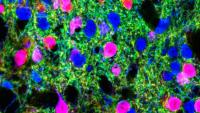Research
-
The Abate-Shen Lab focuses on prostate and bladder cancer and encompasses mechanism-based studies, analyses of genetically-engineered mouse models, and state-of-the-art systems biology approaches.
-
The Colecraft Lab is currently focused on the development of novel genetically-encoded ion channel modulators, Ion channelopathies, and Molecular physiology of voltage-gated Ca2+ channels.
-
The Concepcion lab studies how chromatin deregulation impacts tumor evolution with a focus on lung cancer.
-
Dr. Diano’s research focuses on intracellular nutrient sensing mechanisms in brain cells regulating energy and glucose metabolism, and how their derangement promotes development of metabolic disorders
-
The Fan Lab studies the molecular mechanisms by which G protein-coupled receptors (GPCRs) transmit signals across biological membranes.
-
The Harrison Lab's main area of research interest is in synaptic transmission, especially at inhibitory synapses, which are necessary for the normal processing of information in the mammalian brain.
-
The research in the Hen Lab is focused on the contribution of serotonin (5-HT) receptors to pathological states such as depression and anxiety.
-
The Ju Laboratory focuses on the design and synthesis of novel molecules for biological engineering, imaging, and the development of new technologies for genomic research.
-
The Kass Lab is focused on understanding the molecular physiology and pharmacology of congenital arrhythmias.
-
The Kellendonk laboratory uses mouse genetic tools in an effort to understand the biology that underlies cognitive symptoms of schizophrenia.
-
The Marx Lab studies the regulation of ion channels by macromolecular complexes.
-
The Miller Lab focuses on disruption of neurotransmitter storage and the loss of dopamine neurons in Parkinson's disease, and role of environmental factors in disease development.
-
The Prince Lab studies the interaction of the host and bacterial pathogens in both the airway and skin.
-
The Sharma Lab focuses on the development and function of neural circuits that lead to pain.
-
The Sieglebaum Lab is leading efforts to understand how electrical signals in the brain encode memories that can last a lifetime, and how changes to these signals play a role in psychiatric disorders.
-
The Steinberg Lab focuses on the mechanisms that underlie the physiologically important changes in cardiomyocyte adrenergic receptor responsiveness.
-
The Sulzer Lab studies the physiology and cell biology of neurotransmission, particularly with dopamine and the striatum, and mechanisms involved in both normal and diseased functions of these systems
-
The Yan Lab focuses on the molecular and cellular mechanisms of cellular stress and survival in aging and neurodegenerative disorders relevant to Alzheimer’s disease and diabetes.
-
The Yang Lab investigates the intrinsic and extrinsic mechanisms governing cancer cell state transitions and aims to develop a comprehensive and quantitative roadmap of tumor evolution.
-
The Yu Lab focuses on the chemical biology of novel covalent protein modifications in the human proteome.

